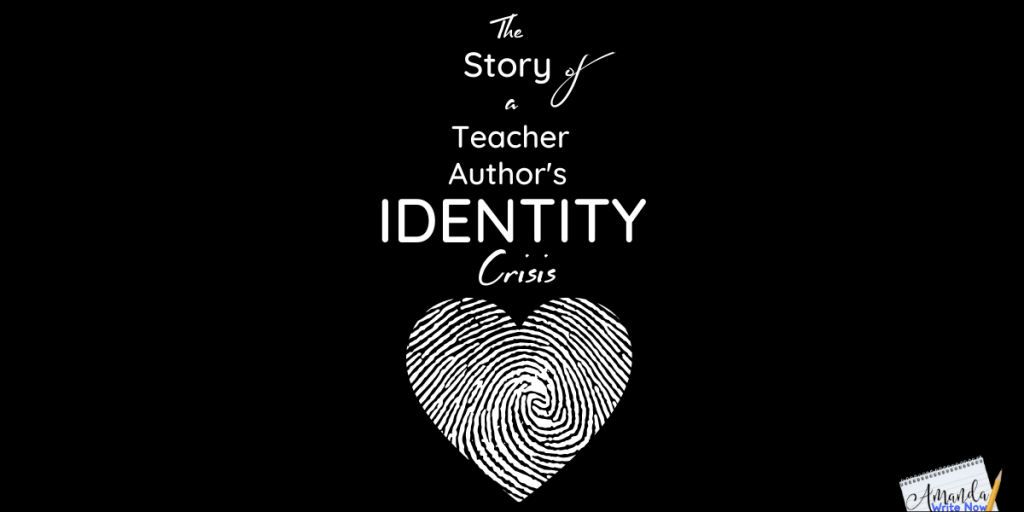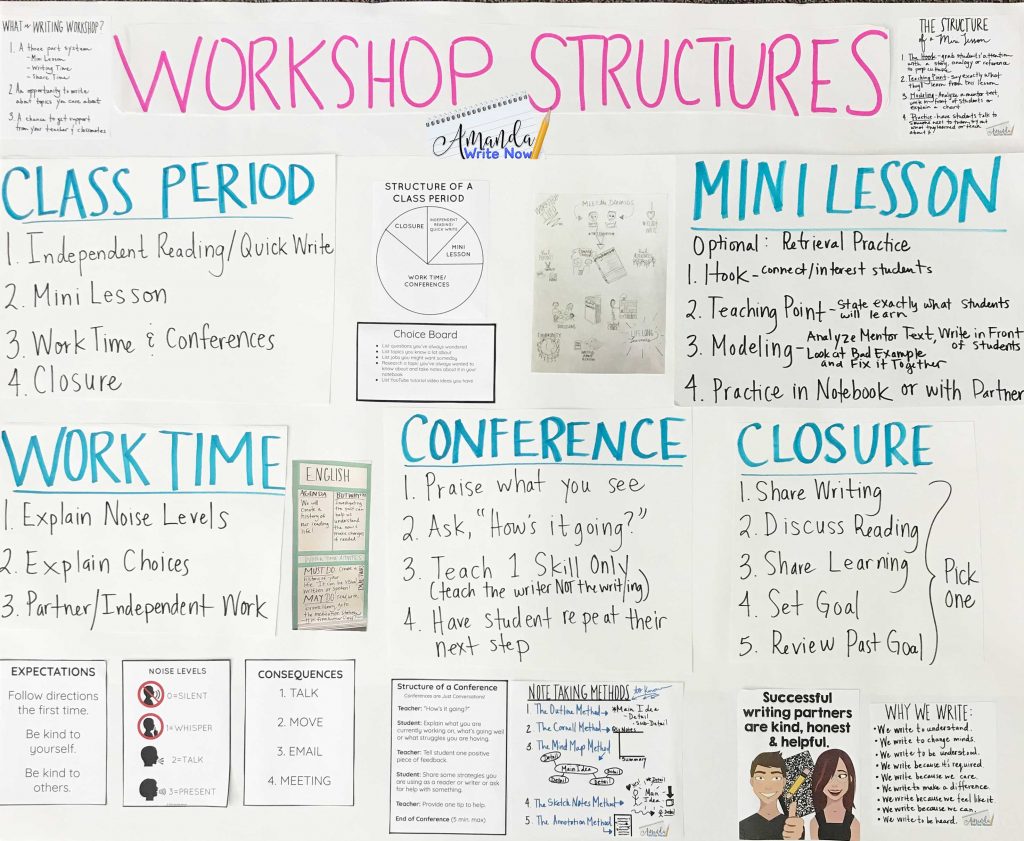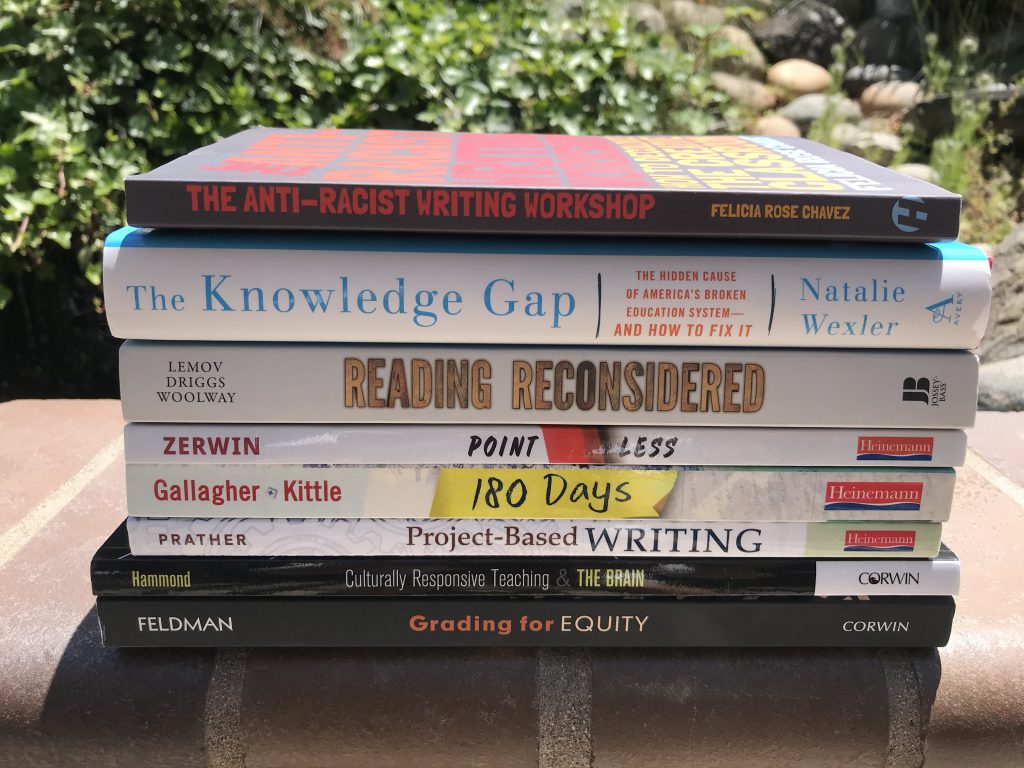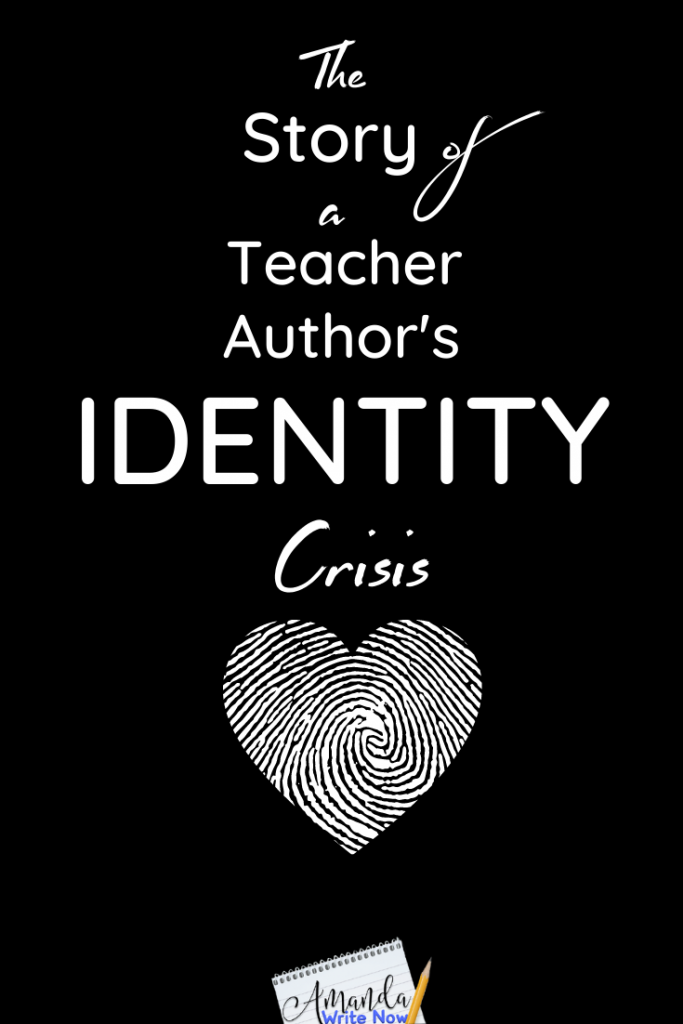
I’ve learned and changed tremendously since the events of 2020-2021, you might even call what’s happened an identity crisis…I want to share this story here to make sense of everything for myself but also because I know there are many teachers out there that can relate.
I’ve always been a very passionate person. My enthusiasm for learning, taking what I learn, and putting it into action immediately, can be invigorating, inspiring and incredibly productive. But, over the years I’ve come to understand that this way of being can also cause harm. Diving head first into something because I believed wholeheartedly in it, has taken a toll on my health and has caused me to make many, potentially avoidable, mistakes.
About 13 years ago I learned about reading workshop and soon after, writing workshop. First, I read Nancie Atwell’s In the Middle, then I proceeded to read Lucy Calkins’ The Art of Teaching Reading as well as The Art of Teaching Writing. Soon after, I was hired at a charter school that required using Calkins’ Units of Study. While many teachers were complaining about the wordiness of The Units of Study, I was obsessed and read them cover to cover. I even went as far as reading The Units of Study from other grade levels that I didn’t even teach!
I was captivated by the workshop approach because I desperately wanted my students to feel that what we were doing in our classroom mattered, that it was preparing them for life. Of all the methods I’ve learned for how to teach reading and writing, workshop came closest to meeting this desperate need to make things relevant for my students.

When I first began implementing workshop, it was very challenging and complex. The biggest problem was that I didn’t know how to support 30 students at so many different levels in their reading and writing skills. When I sent students off to read/write after my mini-lessons, chaos seemed to ensue (this went on for years). As time went on, I developed noise levels, choice boards and charts labeled, “No Ideas?!”, “Done!?!” and “When You Think You’re Done, You’ve Just Begun!”. Still, I struggled to maintain productivity during the independent portion of workshop and I struggled to conference with every student during a unit. I felt like a failure when it seemed impossible to follow up with students in second conferences.
I also felt like a failure in terms of supporting struggling readers and writers. No matter what I did, they still seemed to struggle even by the end of the year. I’ve written extensively about this topic in order to organize the methods I had in my toolbox.
One day, I was scouring one of the Units of Study books for help when I came across a section at the end where Lucy and colleagues advocated for teachers developing their own mini-lessons and units. This was a huge ah-ha moment for me and a turning point in my life. I remember laughing out loud and feeling a sense of pure joy at the thought that I could write my own mini lessons and units.
The years following this epiphany I wrote and wrote and wrote some more. My classroom became a place of experimentation and inspiration for the creation of these mini lessons and units. This continued for years. I started my own Teachers Pay Teachers store in 2013 and I started my blog a year later. It’s hard to believe this blog has been around for 7 years now! Here are some of the units I’ve created…
Workshop seemed like the answer to so many of my teaching problems. It gave me a path forward for planning my own engaging reading and writing units and increasing student motivation. And the workshop method did make the work we were doing in our classroom more meaningful, more real world.
I’ve been writing pretty consistently about reading and writing workshop since then…Until the pandemic and the Black Lives Matter movement picked up incredible momentum after the murder of George Floyd.
These events caused me to realize how fragile we all are. More importantly, it made me realize the ways in which our unconscious biases permeate day to day life and moment to moment decisions. I now understand biases develop throughout lifetimes due to the influences of family, culture and history. We are all heavily influenced by these three elements of life. I’ve severely underestimated the impact family, culture and history has on who I am and the decisions I’ve made up to this point. As the world sheltered in place and mourned the unjust deaths of so many black and brown people, I turned to books about equity, social justice and race in the classroom.
During this time I ended up making the decision to take the 2019-2020 school year off. There are a multitude of factors that went into this decision including my daughter’s needs, my distaste for distance learning and my fear of getting COVID-19. I read numerous books about culturally responsive teaching while also facilitating distance learning for my daughter. I shared what I was learning from these books in the summer of 2021 during my Summer Reading Series Event, where I outlined my main takeaways for 8 professional development books about equity in education.

Since then, I got a job teaching 6th grade English and Social Studies at my old school. I also stopped writing blog posts, emailing my subscribers and posting on social media.
This wasn’t intentional, it just happened. The reason? Now comes the identity crisis part…
I’m currently questioning everything I’ve ever written down, including the curriculum I sell, the courses I’ve created and the things I’ve taught in the past. The version of myself before the pandemic and George Flloyd’s murder, does not exist anymore and I’m not sure what new version of myself will replace the old…yet.
All I know is that everything I do from here forward is for the purpose of promoting social justice in schools. There is so much that can be done and that I’ve already begun doing, including experimenting with equitable grading practices, getting student input more regularly and diversifying the texts I expose to students. But, everything needs to be done thoughtfully, no more diving in without thinking, questioning and critically examining the teaching methods I use. Student input has helped tremendously with this.
These new ways of teaching are exciting but one thing continues to nag me…everything I’ve written and created without an equity lens is still living on my podcast, blog, Teachers Pay Teachers store and in the lessons that paying members are still using in their classrooms to this day. This means I must assess all that I’ve created (which includes hundreds of pages, maybe even thousands).
I need to go back and evaluate from my new, very uncertain, point of view. I also want to share the ways in which I’ve been experimenting with equitable teaching practices in my classroom, not as an authority on the subject, but as a fellow teacher who cares deeply about changing the ways in which we approach educating our students so that they feel heard, seen and valued.
If you are a teacher (you probably are if you are listening to this) or a teacher author who cares deeply about social justice issues then you are in the right place. The episodes and blog posts going forward will be thoughtfully created with a focus on teaching reading and writing with an equity lens. I realize this work is not easy and will be messy and that my identity crisis will continue as I constantly question my beliefs, worldview and what is best for kids.
I’ve spent years searching for the most impactful ways to teach effectively and in that search I found strategies I fell in love with (like workshop), I ran with, convinced they would solve my problems and often they did, temporarily. What was really happening was that I was setting the tone in my classroom. I was enthusiastic, so many of my students were too. The truth is, there are no clear answers, there is no one right way to teach and a lack of clear answers and uncertainty causes discomfort. So, I continue to seek answers, to ease this discomfort. I continue to seek out and try new ways of teaching because I care.
The baffling question is this: how can it be that in all the years of the existence of public education, we still don’t have clear answers as to how best to educate ALL our students (no matter their background) and prepare them for happy, healthy lives? I think there are many reasons for why, one of them being that our world has changed so quickly and so drastically and public education has pretty much stayed the same since its creation. There are so many changes that need to happen.
That brings me to the next baffling question: what can a teacher do under these confusing and chaotic circumstances? All I know is what I plan to do: keep learning, keep an open mind and keep searching for and thoughtfully implementing teaching practices that empower students. I also plan to carefully sift through all that I’ve published in the past and rewrite anything that needs reworking with promoting social justice as my top priority. I hope you’ll stick with me through these very necessary and messy growing pains.
If you are interested in sifting through the curricula I’ve written with an equity lens, I’m offering full access to everything I’ve created in exchange for your feedback, help and time. Please contact me at amanda@amandawritenow.com if you are interested!

thank you for sharing. The fact that you acknowledged the chaos in your room when you sent the students off for independent work was important to me. I have been following you for a few years and using your material but I always felt inadequate when it came time to allow the students to work independently. I feel better knowing that it is a process and an independent style that I need to incorporate. Your enthusiasm is what drew me to you and I loved that you could share your story with us.
Christine, thank you so much for taking the time to leave such a vulnerable comment. I believe vulnerability and being honest about the ways in which workshop doesn’t work is vital so we can start experimenting with solutions and not keep doing things that we know, year after year, don’t work. I’m excited to continue sharing and to know that you (and other teachers who read and resonate with this post) are on this journey with me, gives me the confidence to continue! So, thank you.
Amanda,
Your work saved me two years ago. It has shaped my teaching and made me a better teacher. Keep on keeping on. I have faith in you!
Katy
What is the racial makeup of your school community? I live in Idaho – it’s…. Different when it comes to what people value. My school community is very Caucasian, so much that the few Hispanic kids we have make Hispanic jokes/slurs about themselves. Social justice is a joke around here. (And while it doesn’t have to do with race, even sexual identity is attacked still).
I am extremely bothered by all of this. I would move because of all of it, but that honestly feels like running away. (And gives me anxiety thinking about uprooting everything that is my life.)
I look forward to reading what you have discovered and your thoughts moving forward.
Amanda,
I totally understand and relate to all that you wrote in this post. I too am looking at everything with a new lens. I’ve always tried my best to provide my students with a diverse learning experiences, but this last year, I’ve learned that my perspective and way of defining diversity wasn’t exactly right! Teachers of multiple races and backgrounds were sharing their voices on social media and finally I was “getting it!” I’ve been restructuring and looking at my teaching in a whole new way this year, but there’s still a long way to go! Im excited that you are inviting us to explore and go on this journey with you!
Thank you for sharing and for being so thoughtful going forward. Life is messy and so is teaching. I appreciate you acknowledging your experience.
Amanda, I’m also a quiet fan… I am struggling now, too, in my 20th+ year of teaching English learners. Around this time of year, I also have an annual dip in my belief in my skills. I moved to a new school during the pandemic, and I’m still not feeling secure in where I am. I think in a normal year it’s difficult to move students forward. And now, it’s even worse. Students are struggling, and so am I. I hear you. And I appreciate you.
Thank you for being so vulnerable in your sharing with us. Give yourself some grace. Did you do the best you could do at the time? Likely. Now we all know more….so hopefully we will do better. Thanks for what you DO do.
Bravo, Amanda! I am so happy to read your self reflections. I wish ALL teachers had the same drive and motivation to do the same. Even if we don’t make money from what we create, we still need to analyze what we’ve done with a different lens, and acknowledge the mistakes we’ve made in the past in order to create a better future. Although I feel like giving up on education lately, I feel the exact same way you do. The more of us that realize things need to change and are willing to work to make it happen, will be the change. The system is broken and it needs to be fixed! Currently I feel defeated and want to give up, but your words encourage me that there are more of us willing to try. In solidarity, Melissa Scott
Amanda, this is great! You are doing what every teacher needs to do year to year–well, more frequently as our world takes such sharp turns any given day–and that is self-reflection and action. I know my first 5 years of teaching were full of ME and how I wanted my classroom to run and I wish I could start over! But you are so right about changing our lens. It is tough to rework everything we do but so necessary.